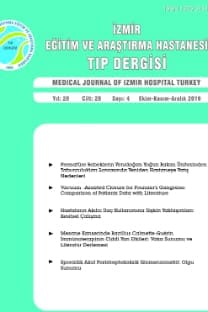COVID-19 PANDEMİSİNİN ACİL GENEL CERRAHİ VE ELEKTİF ONKOLOJİK CERRAHİ AMELİYATLARINA ETKİSİ: RETROSPEKTİF KESİTSEL ÇALIŞMA
EFFECT OF COVID-19 PANDEMIC ON EMERGENCY GENERAL SURGERY AND ELECTIVE ONCOLOGICAL SURGERY: RETROSPECTIVE CROSS-SECTIONAL STUDY
___
- 1. Seretis C, Archer L, Lalou L, Yahia S, Katz C, Parwaiz I et al. Minimal impact of COVID-19 outbreak on the postoperative morbidity and mortality following emergency general surgery procedures: results from a 3-month observational period. Med Glas (Zenica) 2020; 17(2): 275-8.
- 2. Centers for Disease Control and Prevention. Coronavirus disease 2019 (COVID-19) situation summary. Available from URL: https://www.cdc.gov/coronavirus/2019-ncov/summary.html (accessed March 2020).
- 3. Zhu N ZD, Wang W, Li X, Yang B, Song J, Zhao X et al. China novel coronavirus investigating and research team. N Engl J Med 2020; 382(8): 727–33.
- 4. Tao KX, Zhang BX, Zhang P, Zhu P, Wang GB, Chen XP et al. Recommendations for general surgery clinical practice in 2019 coronavirus disease situation. Zhonghua Wai Ke Za Zhi 2020; 58(3): 170-7.
- 5. American College of Surgeons releases recommendations for surgical management of elective operations during COVID-19 pandemic. Available from https://www.facs.org/about-acs/covid-19/information-for-surgeons.
- 6. SAGES and EAES recommendations regarding surgical response to COVID-19 crisis. Released 3/30/2020. Available from https://www.sages.org/recommendationssurgical-response-covid-19/.
- 7. Spolverato G, Capelli G, Restivo A, Bao QR, Pucciarelli S, Pawlik TM et al. The management of surgical patients during the coronavirus disease 2019 (COVID-19) pandemic. Surgery 2020; 168(1): 4-10.
- 8. Gilat R, Haunschild ED, Tauro T, Cole BJ. Recommendation to optimize safety of elective surgical care while limiting the spread of COVID-19: Primum Non Nocere. Arthrosc Sports Med Rehabil 2020: 27; 2(3): e177–83.
- 9. Rubino F, Cohen RV, Mingrone G, le Roux CW, Mechanick JI, Arterburn DE et al. Bariatric and metabolic surgery during and after the COVID-19 pandemic: DSS recommendations for management of surgical candidates and postoperative patients and prioritisation of access to surgery. Lancet Diabetes Endocrinol 2020; 8(7): 640-8.
- 10. Yu GY, Lou Z, Zhang W. Several suggestion of operation for colorectal cancer under the outbreak of Corona Virus Disease 19 in China. Zhonghua Wei Chang Wai Ke Za Zhi 2020; 23(3): 9-11.
- 11. Whithford E. Pandemic hits academic hospitals hard. Inside Higher RAMA on Healthcare ED May 4, 2020. Available from https://ramaonhealthcare.com/pandemic-hits-academic-hospitals-hard/.
- 12. American Collage of Surgeon COVID-19: Elective case triage guidelines for surgical care. [homepage on the Internet] c2020 [updated 2020 Mar 24; cited 2020 Apr 10] Available from: https://www.facs.org/covid-19/clinicalguidance/elective-case.
- 13. Türkiye Kanser İstatistikleri TCSB, Halk Sağlığı Genel Müdürlüğü, 2018.
- 14. Al-Shamsi HO, Alhazzani W, Alhuraiji A, Coomes EA, Chemaly RF, Almuhanna M et al. A practical approach to the management of cancer patients during the novel Coronavirus Disease 2019 (COVID-19) Pandemic: An International Collaborative Group. Oncologist 2020; 25(6): e936-e45.
- 15. İlhan E, Oztop M , Üreyen O , Yıldırım M. Covid-19 Pandemisinin genel cerrahi kliniğinde acil ve elektif cerrahi girişimlere olan etkisinin değerlendirlimesi: kesitsel çalişma. Ankara Eğitim ve Araştırma Hastanesi Tıp Dergisi 2020; 53(3): 202-5.
- 16. Dick L, Green J, Brown J, Kennedy E, Cassidy R, Othman S et al. Changes in Emergency General Surgery During Covid-19 in Scotland: A Prospective Cohort Study. World J Surg 2020; 44(11): 3590-4.
- 17. Patriti A, Baiocchi GL, Catena F, Marini P, Catarci M, FACS on behalf of the Associazione Chirurghi Ospedalieri Italiani (ACOI). Emergency general surgery in Italy during the COVID-19 outbreak: first survey from the real life. World J Emerg Surg 2020; 15(1): 36.
- 18. Vanni G, Pellicciaro M, Materazzo M, Bruno V, Oldani C, Pistolese CA et al. Lockdown of breast cancer screening for COVID-19: Possible scenario. In Vivo 2020; 34(5): 3047-53.
- 19. Alboraie M, Piscoya A, Tran QT, Mendelsohn RB, Butt AS, Lenz L et al. The global impact of COVID-19 on gastrointestinal endoscopy units: An international survey of endoscopists. Arab J Gastroenterol 2020; 21(3): 156-61.
- ISSN: 1305-5151
- Başlangıç: 1995
- Yayıncı: İzmir Bozyaka Eğitim ve Araştırma Hastanesi
Hilal AKSOY, Öznur ŞAHİN, Esra Meltem KOÇ
MEME KANSERİ GELİŞİMİNDEKİ PROGNOSTİK FAKTÖRLER: ERKEN VE GEÇ EVRE KANSERLERİN KARŞILAŞTIRILMASI
Cenk ŞİMŞEK, Murat KARATAŞ, Baha ZENGEL
THE EFFICACY OF HYDROXYCHLOROQUINE IN HOSPITALIZED COVID-19 POSITIVE PATIENTS
Şükran KÖSE, Gözde DERVİŞ HAKİM, Melda TÜRKEN, Pelin ADAR, Sabri ATALAY, Kamil MERT, Bengü Gireniz TATAR
Gizem SARI, Nafiye URGANCI, Gül ÖÇELİK, Merve USTA
HASTANEYE YATAN COVID-19 POZİTİF HASTALARDA HİDROKSİKLOROKİNİN ETKİNLİĞİ
Bengü GİRENİZ TATAR, Sabri ATALAY, Melda TÜRKEN, Pelin ADAR, Gözde DERVİŞ HAKİM, Şükran KÖSE, Kamil MERT
PANSİTOPENİ / BİSİTOPENİSİ OLAN ÇOCUKLARIN KLİNİK VE ETİYOLOJİK AÇIDAN DEĞERLENDİRİLMESİ
Abdullah DURHAN, Abdullah ŞENLİKC, Rıfat BEZİRC, Marlen SÜLEYMAN, Koray KOŞMAZ, Yusuf Murat BAĞ, Ümit MERCAN, Mevlüt Recep PEKÇİC
Mine Şebnem KARAKAN, Beyza ALGÜL DURAK
İKİNCİ TRİMESTER MATERNAL SERUM BELİRTEÇLERİNİN SAĞLIKLI GEBELERDE DOĞUM ZAMANINI ÖNGÖRMEDEKİ ROLÜ
Aysegul GULBAHAR, Seda AKGUN KAVURMACI
DEPREM SONRASI GÖÇ EDEN ERGENLERDE GERİLİM TİPİ BAŞ AĞRISI: KONTROLLÜ ÇALIŞMA
